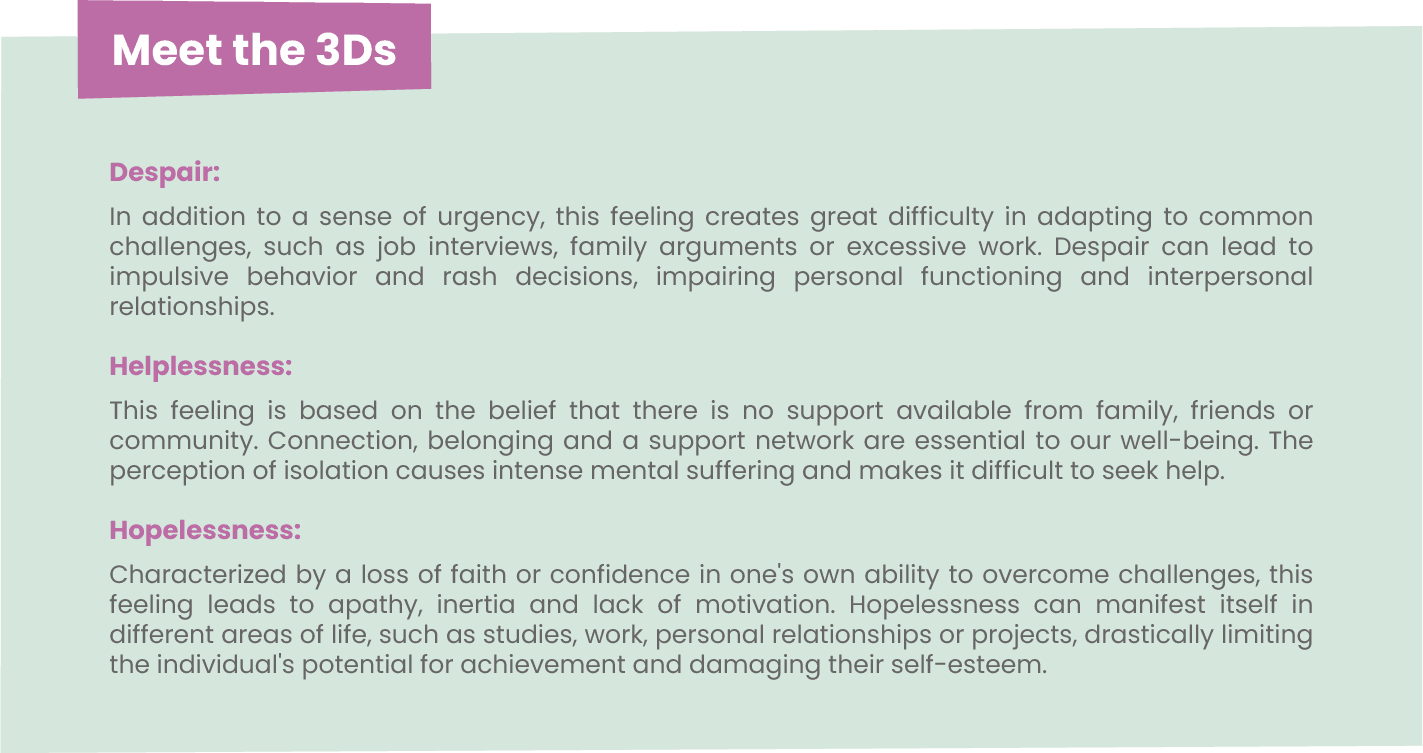
Self-knowledge and improving socio-emotional skills are crucial to preventing mental disorders. In this article, we invite you to learn about three feelings that have a strong impact on overall health: hopelessness, despair and helplessness – the 3Ds (desesprança, desespero and desamparo, in Portuguese), considered by the Brazilian Society of Psychology as triggers for the development of mental disorders, such as depression or even suicidal ideation.
Furthermore, recognizing when our mental health is not good, without guilt or shame, is essential to seeking help and obtaining an early diagnosis and adequate monitoring – key points for the effectiveness of treatments and promotion of quality of life.

Coping strategies
Understanding and recognizing these feelings enables us to spot the warning signs and seek help, or even to empathize in order to support the people around us. From there, it is important to reflect on how we can deal with the 3Ds. There are some fundamental points and strategies that we have organized into three categories below:
![]()
Acceptance: The first step is to recognize and embrace unpleasant emotions as part of the human experience, without trying to suppress or deny them.
Identification: Reflecting on and seeking to understand the causes and thought patterns associated with these feelings is key to transforming them.
Actions: Small actions can be very helpful – writing about your feelings, talking to someone you trust, performing breathing or relaxation exercises are some examples.
![]()
Reevaluation: Trying to assess the situation more objectively, as if it had happened to someone else, is a good way to put it into perspective and give the real dimensions of the problem.
Cultivate Gratitude: Focusing on the positive aspects of life and the experiences that bring joy and well-being – cultivating these moments and being grateful is extremely beneficial to mental health.
Optimism: Another effective strategy is to replace negative thoughts with more realistic and reliable interpretations. Viewing challenging experiences as learning experiences and focusing on the present moment and the possibilities for change provides hope.
![]()
Strengthening Bonds: Cultivating healthy relationships with family, friends and community also positively impacts mental health. Seek spaces for dialog and sharing, prioritizing moments of social interaction.
Assertive Communication: Expressing feelings and needs clearly and respectfully, seeking to build relationships of trust and establishing certain boundaries are initiatives that protect mental health.
Specialized Help: Seeking out psychologists, psychiatrists or other mental health professionals to support you in the process of self-knowledge and receiving appropriate treatment, when necessary, is a sign of courage – a decisive act of self-care promoting well-being throughout life.
Feelings and emotions are fleeting
Last but not least, it is essential to reinforce the ephemeral nature of feelings and emotions. If any of these feelings manifest themselves intensely and persistently, this is a sign that there is an issue that needs attention.
Creating a new culture of mental health care is essential so that everyone can develop the ability to overcome challenges. We need to talk about it, bring it up at the dinner table and with friends, creating space for sharing experiences and for socio-emotional development.












